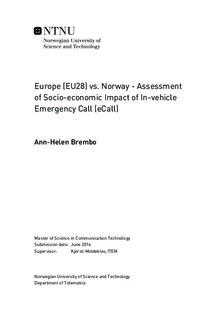Europe (EU28) vs. Norway - Assessment of Socio-economic Impact of In-vehicle Emergency Call (eCall)
Master thesis
Permanent lenke
http://hdl.handle.net/11250/2406305Utgivelsesdato
2016Metadata
Vis full innførselSamlinger
Sammendrag
In 2018, the emergency service eCall, based on the E112 initiative, will be implemented throughout the European Union (EU) and the European Economic Area (EEA). In the event of a traffic accident, the in-vehicle system will automatically create a communication channel with the nearest emergency response centre. The system will also send a minimum set of data which includes the vehicle s location, what sensor in the vehicle that was activated, and more. The purpose of the emergency service is to reduce the consequences of traffic accidents by improving the response time of emergency services.
Since, the introduction of the eCall project, the EU and several member states have conducted studies to determine the socio-economic impact of the service for society. Through literature studies, this thesis has reviewed a selection of these studies and compared them in term of results, methods, and models. Most of the studies results are not that accurate since the framework of the eCall system was completed after their publication.
In 2011, the European Commission (EC) created their own impact assessment of eCall. This study was the basis for the decision to make the introduction of eCall mandatory in the EU and EEA. A thorough evaluation of the EC s impact assessment has been conducted in this thesis. The model used for the benefit-cost analysis was reviewed together with the main benefit and cost parameters. The thesis also looked at the technical aspects included and excluded from the study. Even tough the study is more pessimistic than earlier reports some parameters are still too optimistic. As for the technical part, very few aspects are included in the assessment. The system is just assumed to be fully operational.
As part of the EEA, Norway is obligated to implement the eCall service. However, very few analyses have included this country. This thesis has therefore conducted a benefit-cost analysis utilising the model of the EC s impact assessment with modifications to fit it to Norwegian conditions. In an overall perspective, eCall might be beneficial for Norway. However, a sensitivity analysis showed that small changes to the estimated reductions can render eCall unbeneficial for Norway.
The Norwegian Public Roads Administration have their own evaluation tool for ITS measures. This thesis assessed the tool s suitability for the eCall service in its current version and suggested potential changes.
